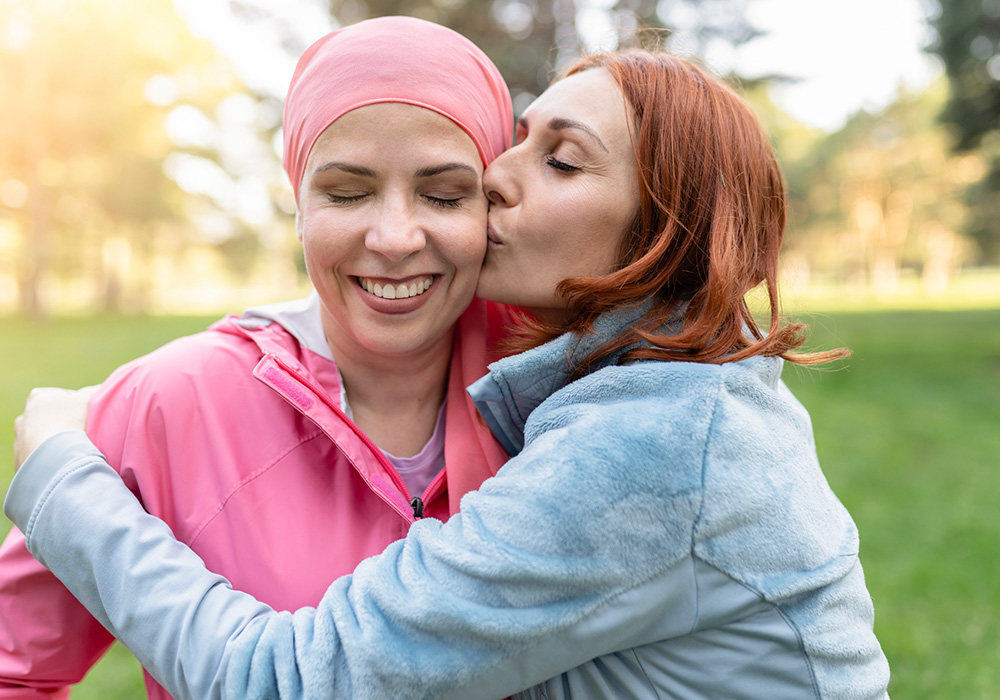What makes you a caregiver?
You don’t need to be a family member or even a close friend to qualify as a caregiver. Just as the word suggests,
a caregiver is someone who gives care. As long as you give care, you’re a caregiver.
Caring for someone is a big responsibility, so it’s important to care for yourself as well.
Many caregivers are worried or feel guilty about leaving their loved one alone. It’s important to remember that you also have personal responsibilities to keep up with. If you live a considerable distance away, or if you are not able to give as much support as you would like, something as simple as a phone call, email, or text message can help lift their spirits.
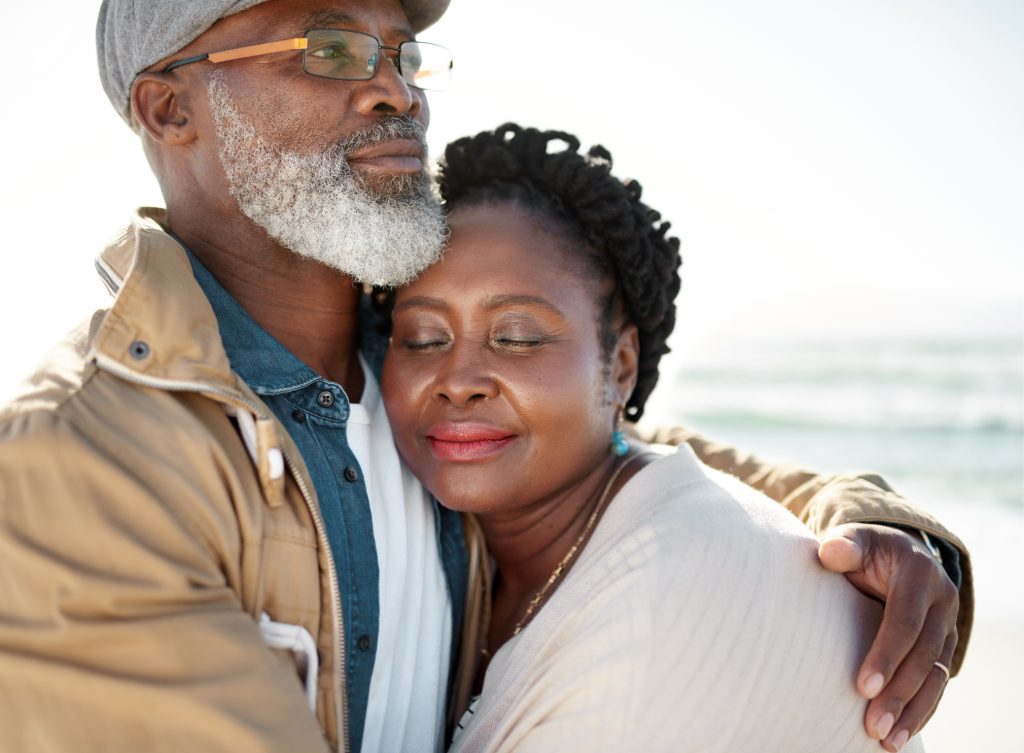
Depending on the type of care your loved one requires and the stageThe extent of a cancer in the body. of their disease, they may want or need different levels of support, particularly in a medical setting.

Considering your loved one’s feelings and needs
Your loved one might find it difficult to have to depend on you; they may also worry about being too much of a burden. Conversely, you may sometimes feel that you’re being overbearing, or not helping enough.
Talk to and work with your loved one to find a balance that enables you to both have control over your own lives. Keep communicating on a regular basis because both your needs might change. You’re a team and in this together. Remember to keep an open dialogue for discussion.
To help your loved one feel better about being cared for, allow them to maintain their independence whenever possible.

Helping with life
Your loved one can sometimes feel very tired or overwhelmed and may need help with everyday tasks. There may also be times when they feel reasonably well and can manage on their own. Make sure you’re available to help them when necessary and let them be independent when you’re not needed.
Due to the myeloma and/or its treatment, your loved one’s blood counts may put them at higher risk of bleeding and infection. If applicable, ask the healthcare team for home care instructions and be sure to enforce special precautions in your loved one’s home.
Remember: You don’t need to do everything on your own. Reach out to other people such as family members so that they can share the workload. Friends are usually willing to help, but they are often too shy to ask or don’t know in what capacity. To help your loved one maintain a sense of privacy and dignity, consider delegating certain intimate tasks to a professional.
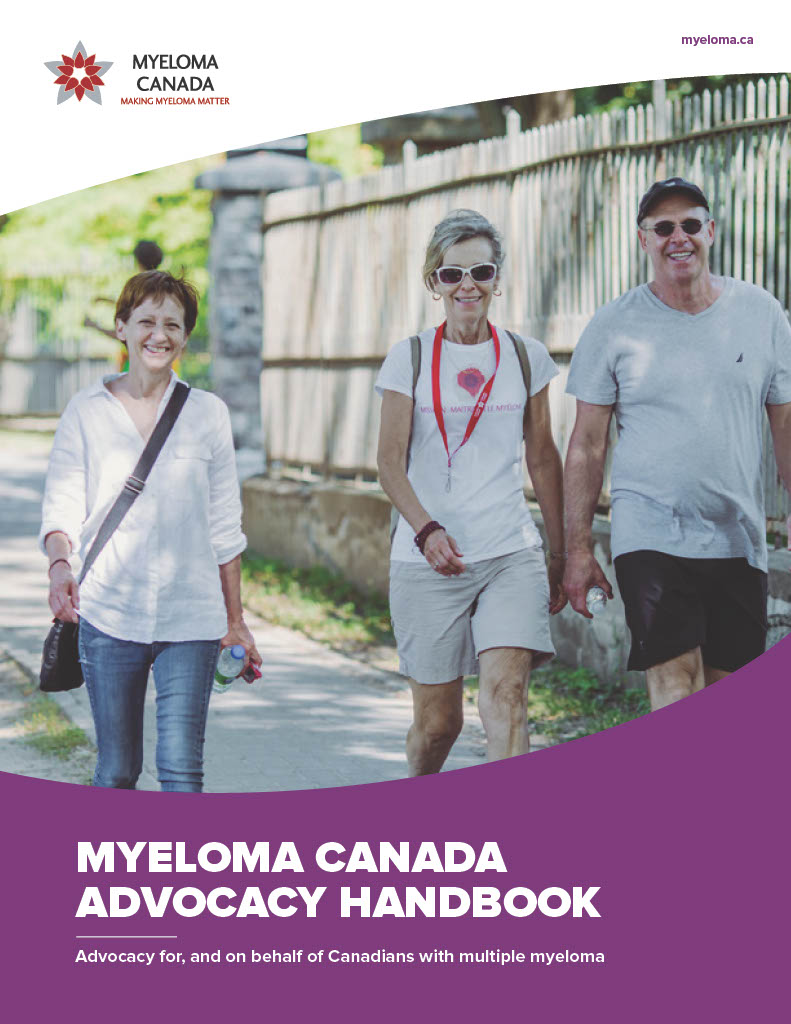
Learn more about how to be an effective advocate for your loved one, and how to help them advocate for themselves, in our Self-Advocacy Handbook.
It’s important to take care of yourself
Caregivers often become exhausted and feel like they’ve lost control over their life—it’s common to neglect looking after yourself properly while trying to handle both caregiving and your regular daily responsibilities. But it’s important to remember that you cannot possibly be at your best if you’re physically or emotionally drained.
When exhausted, you’re more likely to make bad decisions and take your frustrations out on your loved one. In the long run, caregivers who neglect looking after themselves are at a higher risk of experiencing burnout and other health issues.
Your health and well-being is a priority. Not taking care of yourself can result in long-term health problems, depression, and anxiety. Be sure to make time for yourself and do the things you enjoy. Try to prioritize what is most important, and put aside what is not important in terms of caregiving and your well-being.

Get the support you need
Connect with others who understand what you’re going through.
Rather than thinking about what lies ahead, one of the most important things you can do for your mental health is to try and live in the moment and take things one day at a time. If you need a break from caregiving, arrange for a professional to come into your or your loved one’s home, or consider getting respite care (e.g. short stay in a facility) for your loved one.
Many of the complementary therapies recommended for people living with myeloma can also benefit their caregivers and may offer a way for you to connect with your loved one outside of a medical context.

Accepting your feelings
It’s common to experience an array of emotions given your specific and unique situation: hopeful one minute, despondent the next. It’s all normal and expected. The very word “cancerA term for diseases in which malignant cells divide without control. Cancer cells can invade nearby tissues and spread through the bloodstream and lymphatic system to other parts of the body.” strikes fear in many people’s hearts. When you first hear the diagnosisThe process of identifying a disease by its signs and symptoms., your mind may race ahead of you, imagining worst-case scenarios. Remind yourself to take things one day at a time. Each day will bring new learnings, skills, and coping strategies.
Recognizing burnout
The line between “working hard” and “burnout” varies from person to person. That said, here are some signs that may help you recognize when tiredness has become burnout.
| State of mind | How it may express itself |
|---|---|
| Denial | You refuse to consider the seriousness of the disease: “I know my loved one will get better.” |
| Impatience | You’re annoyed by everyone’s questions: “If I have to explain myeloma one more time, I’ll scream.” |
| Anxiety | You worry constantly about what the future holds and whether you can manage it. |
| Exhaustion | You don’t have the energy to complete daily tasks and constantly fight the urge to lie down. |
| Lack of concentration | You are more forgetful than usual, resulting in missed tasks, deadlines, and appointments. |
| Withdrawal | You don’t care about engaging in activities that once brought you pleasure and don’t take steps to get together with other people. |
| General “bad feeling” | You can’t remember the last time you felt energetic and positive. |

Getting past burnout
To prevent or get past burnout, turn to other people—from family and friends to therapists and support groups. Aim to build up a core “village” that can help with logistical tasks and provide emotional support. Although you may consider your family to be your first resource, always remember that your loved one’s healthcare team can also provide caregiver support. They are there to help, so reach out to them as needed.
Communication is important
You may hesitate to speak your mind for fear of causing pain, but honest discussions foster connection and engagement with life. At the same time, you don’t want to get stuck in a pattern of reminiscing about “the way things were.” Rather than dwelling on what you miss, keep the focus on the here and now. If a sensitive issue arises, deal with it sooner rather than later to prevent resentment from settling in.
Perhaps most important of all is to open the door for your loved one to talk, while listening without judgment.

Stay connected to the national myeloma community, see stories of people living with myeloma, stay up to date on Myeloma Canada educational events, awareness and advocacy campaigns, research updates, and much more with our monthly Myeloma Matters newsletter.
Speaking to children
If you and your loved one have children, you may wonder what to tell them. While your first instinct may be to shield them from pain, they will surely sense that something is wrong. Saying nothing may leave them scared and confused.
In general, children cope better with some information than with none at all. Keep it simple and age appropriate, and always leave children with hope. The hospital or cancer centre’s social worker can also help by providing suggestions and strategies on how to speak with children.
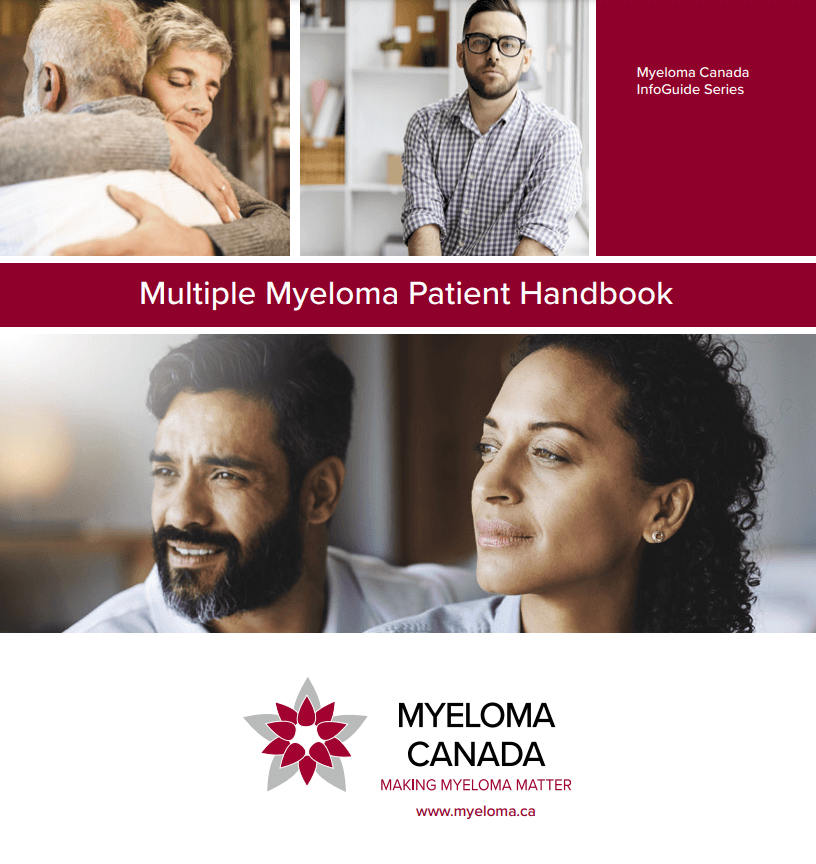
Speaking to others
If you and your loved one decide that you will handle informing other people about the diagnosis and/or keeping people updated on their condition, it may be best to keep the initial conversation short and simple, while stating that you’ll be happy to answer questions at a later date.
You can also give people a copy of the Caregiver Handbook or the Multiple Myeloma Patient Handbook to review. And remember, it goes both ways: family and friends can help comfort you and serve as a sounding board for some of your own concerns.
Talk to people who understand
Perhaps the most valuable thing is to connect with other caregivers. These are your true peers who can validate your experience, give you fresh ideas, and offer a shoulder to lean on. Remember, even though this experience can at times feel isolating, you’re not alone.
Virtual support groups for:
Carers Canada — www.carerscanada.ca
The Canadian Caregiver Network — canadiancaregiving.org
The Canadian Home Care Association — www.cdnhomecare.ca
Caregivers Alberta — www.caregiversalberta.ca
Family Caregivers of British Columbia — www.familycaregiversbc.ca
New Brunswick Home Support Association — www.nbhsa.ca
CareGivers — www.caregiversnl.com
Caregivers Nova Scotia — www.caregiversns.org/
Caregivers’ Action Centre — https://www.facebook.com/caregiversaction/
Home Care Ontario — www.homecareontario.ca
Ontario Caregiver Organization — www.ontariocaregiver.ca
Ontario Caregiver Coalition — www.ontariocaregivercoalition.ca
Association des proches aidants de la Capitale-Nationale — www.apacn.org
Carrefour des proches aidants de Québec — www.prochesaidantsquebec.com
Regroupement des aidants naturels du Québec — www.ranq.qc.ca
Regroupement des aidants naturels de la Mauricie — www.rdanm.org
Regroupement des aidants et aidantes naturels de Montréal — www.raanm.net
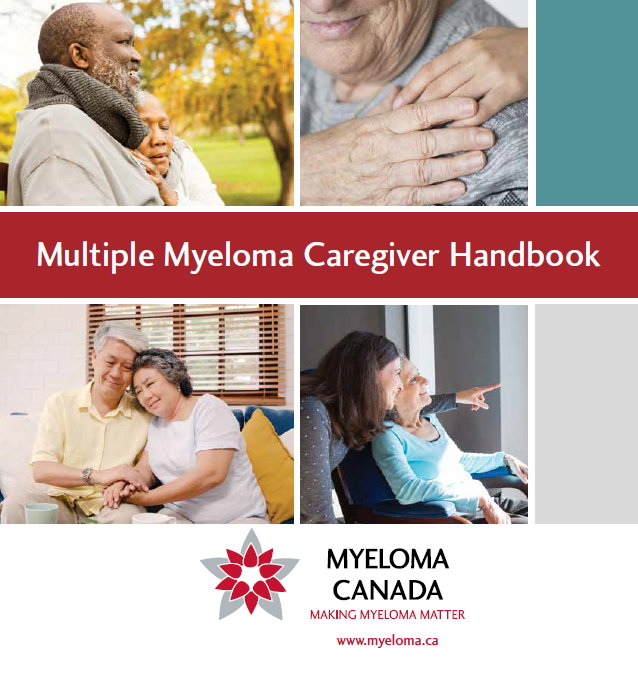
For more information, download the Multiple Myeloma Caregiver Handbook
If you are supporting a loved one living with myeloma, you are a caregiver. Myeloma Canada designed this Handbook to provide you with practical information about caring for your loved one and maintaining your own well-being.




